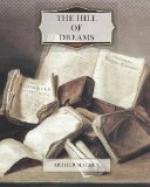Lucian was not especially interested in this hatred of the barbarian for the maker, except from this point, that it confirmed him in his belief that the love of art dissociated the man from the race. One touch of art made the whole world alien, but surely miseries of the civilized man cast amongst savages were not so much caused by dread of their ferocity as by the terror of his own thoughts; he would perhaps in his last despair leave his retreat and go forth to perish at their hands, so that he might at least die in company, and hear the sound of speech before death. And Lucian felt most keenly that in his case there was a double curse; he was as isolated as Keats, and as inarticulate as his reviewers. The consolation of the work had failed him, and he was suspended in the void between two worlds.
It was no doubt the composite effect of his failures, his loneliness of soul, and solitude of life, that had made him invest those common streets with such grim and persistent terrors. He had perhaps yielded to a temptation without knowing that he had been tempted, and, in the manner of De Quincey, had chosen the subtle in exchange for the more tangible pains. Unconsciously, but still of free will, he had preferred the splendor and the gloom of a malignant vision before his corporal pains, before the hard reality of his own impotence. It was better to dwell in vague melancholy, to stray in the forsaken streets of a city doomed from ages, to wander amidst forlorn and desperate rocks than to awake to a gnawing and ignoble torment, to confess that a house of business would have been more suitable and more practical, that he had promised what he could never perform. Even as he struggled to beat back the phantasmagoria of the mist, and resolved that he would no longer make all the streets a stage of apparitions, he hardly realized what he had done, or that the ghosts he had called might depart and return again.
He continued his long walks, always with the object of producing a physical weariness and exhaustion that would enable him to sleep of nights. But even when he saw the foggy and deserted avenues in their proper shape, and allowed his eyes to catch the pale glimmer of the lamps, and the dancing flame of the firelight, he could not rid himself of the impression that he stood afar off, that between those hearths and himself there was a great gulf fixed. As he paced down the footpath he could often see plainly across the frozen shrubs into the homely and cheerful rooms. Sometimes, late in the evening, he caught a passing glimpse of the family at tea, father, mother, and children laughing and talking together, well pleased with each other’s company. Sometimes a wife or a child was standing by the garden gate peering anxiously through the fog, and the sight of it all, all the little details, the hideous but comfortable armchairs turned ready to the fire, maroon-red curtains being drawn close to shut out the ugly night, the




